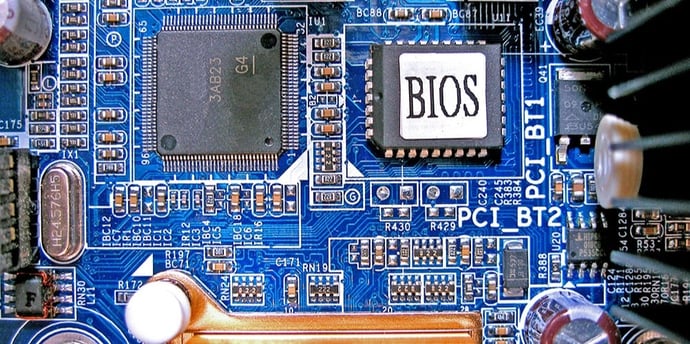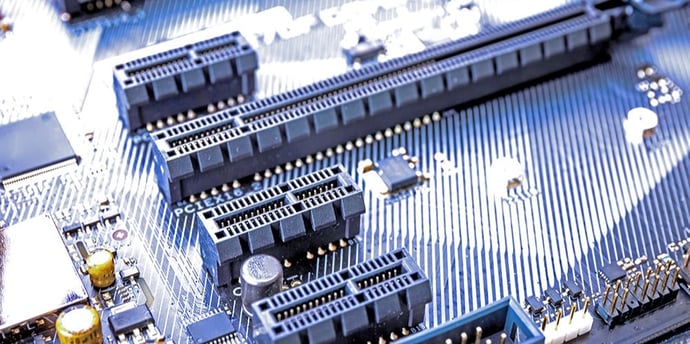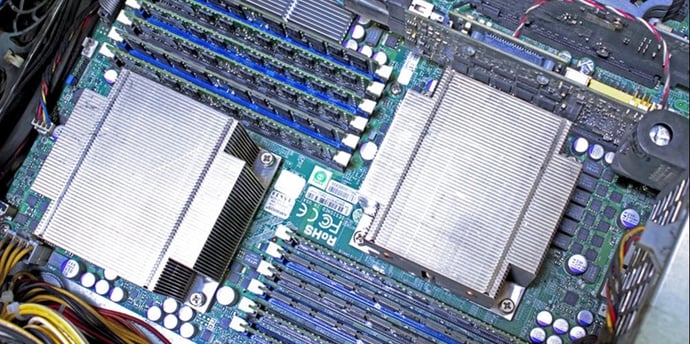Share this
5 Benefits of a Custom BIOS
by Nate Young on Jan 3, 2018 11:12:59 AM

Photo: Looking for a custom BIOS solution? These are some key considerations to keep in mind.
A variety of custom BIOS (Basic Input/Output System) and software solutions can be configured in your rack mount server or workstation to support your particular requirements and needs.
The benefits of a custom BIOS are many, but mainly, a custom BIOS can tweak or tune an existing solution, dramatically overhaul the bootup process to enhance security, increase system manageability, support high-end co-processing hardware, and optimize system performance.
In this blog post, we'll discuss five ways custom BIOSes can enhance your rugged computing solution and what to look for in a computing solutions provider offering them.
1. Security
In today's environment of continual software vulnerabilities, bugs, and patches, staying on top of the latest security technologies and resolutions is paramount. Looking for a rugged computing solutions provider that partners with companies like Intel and AMI to continually monitor for security notifications, patches, and enhancements is essential because the provider will be able to implement related fixes and updates quickly and efficiently, following regression testing and validation.
This includes security fixes and updates related to:
- BIOS
- Firmware
- UEFI specification updates
- Intel AMT
- ME
- Other technologies
Furthermore, you should also be able to request additional security enhancements, such as the disablement of certain bootable devices like USB or optical drives. A custom BIOS from the right computing solutions provider can lock down BIOS parameters and controls to provide increased security and prevent unintended usage. Additionally, a highly secure and reliable BIOS update process should be in place for every rugged computing solution you purchase.
2. System Manageability & Monitoring
Any worthwhile computing solutions provider will have implemented a BMC solution for monitoring a rack mount computer's overall health and condition.
BIOS customizations further enhance the standard IPMI solution, including reporting boot sequence progress, FRU data collection/reporting, and system error notifications. PCIe link health status (correctable/uncorrectable errors) and DIMM status, including ECC detection/correction, patrol scrub, and demand scrub states, can all be reported to the BMC for further processing by system management software.
Additionally, custom SMBios table entries are possible, including memory DIMM SPD data, Ethernet port configurations, and serialization data for manufacturing traceability. These tables can expose hardware features of the system to the OS and/or BMC for enhanced detection, optimization, and reliability.

Photo: A custom BIOS can provide enhancements and tweaks to your system's PCIe performance.
3. PCIe Enhancements
As data centers see an expansion of various high-performance hardware devices supporting cloud computing, artificial intelligence, machine learning, and encryption technologies, PCIe performance can become a bottleneck in overall system capabilities. From NVIDIA and AMD GPUs to Xilinx and Altera FPGAs, being able to trust hardware and software engineers that can work closely with you to improve and support high-performance PCIe hardware endpoints is crucial.
BIOS customizations can provide custom PCIe bifurcation settings, as well as equalization adjustments for tweaking emphasis/de-emphasis, improving signal integrity, and reducing link errors. Also, as PCIe buses increase in size, the BIOS can be enhanced to support increased capacity on the PCIe bus. These enhancements can be particularly important with solutions like large backplanes or expansion chassis that can greatly increase the PCIe bus topology in both size and complexity.
4. BIOS Optimizations
The mainline BIOS shipped with your rack mount computing solution should support a wide variety of hardware and software combinations. This flexibility and robustness should provide a solid, reliable platform for supporting many configurations of CPUs, PCIe devices, USB attachments, and other miscellaneous peripherals.
Some customers settle on a fixed set of hardware requirements and can request BIOS optimizations for increasing reliability, reducing boot times, and optimizing performance. Additionally, BIOS setup default values can be set according to the customer's requirements, including hiding any combination of settings or controls, whether it be for security concerns, system stability requirements, or a streamlined user interface.

Photo: A custom BIOS can provide you with support for your legacy devices.
5. Legacy Support
Many times, the system BIOS is required to support legacy devices such as PCI endpoints, PS/2 devices, or monitors with limited capabilities. Custom IRQ routing and PCI-to-PCIe conversion nuances can require tweaks to the BIOS, or a widely-deployed monitor may require a specific, non-standard resolution. Look for a computing solutions provider that can meet these unique customer requirements down to the last detail.
Add a customized BIOS to the mix, and you got yourself a very powerful and flexible rackmount computer that ensures system stability and reliability for years to come.
Look for manufacturers that offer custom BIOSes
Doing business with a high-performance computer manufacturer that offers BIOS customization lets you, the customer, request a feature-specific BIOS that fits your program's or application's unique firmware and booting needs.
Some manufacturers don't offer BIOS customization, which puts you at the liberty of any BIOS changes on their end and may even leave you without some of the benefits listed above.
At Trenton Systems, we employ BIOS designers who work with Insyde and AMI source code to craft unique and tailored BIOS solutions for customers. These tweaks include, but are not limited to, custom boot options, port enable and disable features, among other characteristics.
Here are five advantages we have that are associated with controlling the BIOS design in-house:
- We make our own processor boards: Before a new Trenton processor board is released, there's a lot of time spent during design to ensure that the boards undergo a proper bring-up. We typically don't know how the end customer will use our processor boards in their application, so our BIOS must remain flexible enough to handle a wide range of PCIe expansion cards, USB, and Ethernet. The BIOS must also be able to enumerate a wide array of memory options.
- Firmware encryption: For security-conscious applications, Trenton can encrypt the firmware on certain processor boards via Intel's Platform Firmware Resilience (PFR). A unique key is the provided to the customer so that they are the only individual who can modify the processor board's firmware.
- Large number of PCIe devices: On occasion, customers will have a specific application that requires a large number of PCIe expansion or NVMe drives. There's only a certain amount of space allocated to enumeration, so for situations like this, Trenton's BIOS designers can work directly with customers to ensure all devices are set up properly.
- Small customizations and tweaks: For minimal or no charge, customers do request custom load screens, such as those with their logo, or a custom boot order, depending on the hard drive to which they default. These upgrades are typically completed very quickly.
- Revision control = same unique BIOS for years: Trenton's BIOS revision control process ensures that all future purchases from a specific customer will include their custom BIOS.
Trenton Systems' ruggedized computing solutions are all built to the highest standards, and we provide a variety of custom BIOS and software solutions for supporting our customers’ particular requirements and needs.
A dedicated team of software and hardware support engineers work closely to provide a feature-rich, generic BIOS solution that supports a wide array of SHB, backplane, hardware, and software combinations for rack mount servers and workstations.
If you would like more information on custom BIOS and software solutions, please reach out to us. We're here when you're ready.
Share this
- High-performance computers (42)
- Military computers (38)
- Rugged computers (32)
- Cybersecurity (25)
- Industrial computers (25)
- Military servers (24)
- MIL-SPEC (20)
- Rugged servers (19)
- Press Release (17)
- Industrial servers (16)
- MIL-STD-810 (16)
- 5G Technology (14)
- Intel (13)
- Rack mount servers (12)
- processing (12)
- Computer hardware (11)
- Edge computing (11)
- Rugged workstations (11)
- Made in USA (10)
- Partnerships (9)
- Rugged computing (9)
- Sales, Marketing, and Business Development (9)
- Trenton Systems (9)
- networking (9)
- Peripheral Component Interconnect Express (PCIe) (7)
- Encryption (6)
- Federal Information Processing Standards (FIPS) (6)
- GPUs (6)
- IPU (6)
- Joint All-Domain Command and Control (JADC2) (6)
- Server motherboards (6)
- artificial intelligence (6)
- Computer stress tests (5)
- Cross domain solutions (5)
- Mission-critical servers (5)
- Rugged mini PCs (5)
- AI (4)
- BIOS (4)
- CPU (4)
- Defense (4)
- Military primes (4)
- Mission-critical systems (4)
- Platform Firmware Resilience (PFR) (4)
- Rugged blade servers (4)
- containerization (4)
- data protection (4)
- virtualization (4)
- Counterfeit electronic parts (3)
- DO-160 (3)
- Edge servers (3)
- Firmware (3)
- HPC (3)
- Just a Bunch of Disks (JBOD) (3)
- Leadership (3)
- Navy (3)
- O-RAN (3)
- RAID (3)
- RAM (3)
- Revision control (3)
- Ruggedization (3)
- SATCOM (3)
- Storage servers (3)
- Supply chain (3)
- Tactical Advanced Computer (TAC) (3)
- Wide-temp computers (3)
- computers made in the USA (3)
- data transfer (3)
- deep learning (3)
- embedded computers (3)
- embedded systems (3)
- firmware security (3)
- machine learning (3)
- Automatic test equipment (ATE) (2)
- C6ISR (2)
- COTS (2)
- COVID-19 (2)
- CPUs (2)
- Compliance (2)
- Compute Express Link (CXL) (2)
- Computer networking (2)
- Controlled Unclassified Information (CUI) (2)
- DDR (2)
- DDR4 (2)
- DPU (2)
- Dual CPU motherboards (2)
- EW (2)
- I/O (2)
- Military standards (2)
- NVIDIA (2)
- NVMe SSDs (2)
- PCIe (2)
- PCIe 4.0 (2)
- PCIe 5.0 (2)
- RAN (2)
- SIGINT (2)
- SWaP-C (2)
- Software Guard Extensions (SGX) (2)
- Submarines (2)
- Supply chain security (2)
- TAA compliance (2)
- airborne (2)
- as9100d (2)
- chassis (2)
- data diode (2)
- end-to-end solution (2)
- hardware security (2)
- hardware virtualization (2)
- integrated combat system (2)
- manufacturing reps (2)
- memory (2)
- mission computers (2)
- private 5G (2)
- protection (2)
- secure by design (2)
- small form factor (2)
- software security (2)
- vRAN (2)
- zero trust (2)
- zero trust architecture (2)
- 3U BAM Server (1)
- 4G (1)
- 4U (1)
- 5G Frequencies (1)
- 5G Frequency Bands (1)
- AI/ML/DL (1)
- Access CDS (1)
- Aegis Combat System (1)
- Armed Forces (1)
- Asymmetric encryption (1)
- C-RAN (1)
- COMINT (1)
- Cloud-based CDS (1)
- Coast Guard (1)
- Compliance testing (1)
- Computer life cycle (1)
- Containers (1)
- D-RAN (1)
- DART (1)
- DDR5 (1)
- DMEA (1)
- Data Center Modular Hardware System (DC-MHS) (1)
- Data Plane Development Kit (DPDK) (1)
- Defense Advanced Research Projects (DARP) (1)
- ELINT (1)
- EMI (1)
- EO/IR (1)
- Electromagnetic Interference (1)
- Electronic Warfare (EW) (1)
- FIPS 140-2 (1)
- FIPS 140-3 (1)
- Field Programmable Gate Array (FPGA) (1)
- Ground Control Stations (GCS) (1)
- Hardware-based CDS (1)
- Hybrid CDS (1)
- IES.5G (1)
- ION Mini PC (1)
- IP Ratings (1)
- IPMI (1)
- Industrial Internet of Things (IIoT) (1)
- Industry news (1)
- Integrated Base Defense (IBD) (1)
- LAN ports (1)
- LTE (1)
- Life cycle management (1)
- Lockheed Martin (1)
- MIL-S-901 (1)
- MIL-STD-167-1 (1)
- MIL-STD-461 (1)
- MIL-STD-464 (1)
- MOSA (1)
- Multi-Access Edge Computing (1)
- NASA (1)
- NIC (1)
- NIC Card (1)
- NVMe (1)
- O-RAN compliant (1)
- Oil and Gas (1)
- Open Compute Project (OCP) (1)
- OpenRAN (1)
- P4 (1)
- PCIe card (1)
- PCIe lane (1)
- PCIe slot (1)
- Precision timestamping (1)
- Product life cycle (1)
- ROM (1)
- Raytheon (1)
- Remotely piloted aircraft (RPA) (1)
- Rugged computing glossary (1)
- SEDs (1)
- SIM Card (1)
- Secure boot (1)
- Sensor Open Systems Architecture (SOSA) (1)
- Small form-factor pluggable (SFP) (1)
- Smart Edge (1)
- Smart NIC (1)
- SmartNIC (1)
- Software-based CDS (1)
- Symmetric encryption (1)
- System hardening (1)
- System hardening best practices (1)
- TME (1)
- Tech Partners (1)
- Total Memory Encryption (TME) (1)
- Transfer CDS (1)
- USB ports (1)
- VMEbus International Trade Association (VITA) (1)
- Vertical Lift Consortium (VLC) (1)
- Virtual machines (1)
- What are embedded systems? (1)
- Wired access backhaul (1)
- Wireless access backhaul (1)
- accredidation (1)
- aerospace (1)
- air gaps (1)
- airborne computers (1)
- asteroid (1)
- authentication (1)
- autonomous (1)
- certification (1)
- cognitive software-defined radios (CDRS) (1)
- command and control (C2) (1)
- communications (1)
- cores (1)
- custom (1)
- customer service (1)
- customer support (1)
- data linking (1)
- data recording (1)
- ethernet (1)
- full disk encryption (1)
- hardware monitoring (1)
- heat sink (1)
- hypervisor (1)
- in-house technical support (1)
- input (1)
- integrated edge solution (1)
- international business (1)
- licensed spectrum (1)
- liquid cooling (1)
- mCOTS (1)
- microelectronics (1)
- missile defense (1)
- mixed criticality (1)
- moving (1)
- multi-factor authentication (1)
- network slicing (1)
- neural networks (1)
- new headquarters (1)
- next generation interceptor (1)
- non-volatile memory (1)
- operating system (1)
- output (1)
- outsourced technical support (1)
- post-boot (1)
- pre-boot (1)
- private networks (1)
- public networks (1)
- radio access network (RAN) (1)
- reconnaissance (1)
- rugged memory (1)
- secure flash (1)
- security (1)
- self-encrypting drives (SEDs) (1)
- sff (1)
- software (1)
- software-defined radios (SDRs) (1)
- speeds and feeds (1)
- standalone (1)
- storage (1)
- systems (1)
- tactical wide area networks (1)
- technical support (1)
- technology (1)
- third-party motherboards (1)
- troposcatter communication (1)
- unlicensed spectrum (1)
- volatile memory (1)
- vpx (1)
- zero trust network (1)
- January 2025 (1)
- November 2024 (1)
- October 2024 (1)
- August 2024 (1)
- July 2024 (1)
- May 2024 (1)
- April 2024 (3)
- February 2024 (1)
- November 2023 (1)
- October 2023 (1)
- July 2023 (1)
- June 2023 (3)
- May 2023 (7)
- April 2023 (5)
- March 2023 (7)
- December 2022 (2)
- November 2022 (6)
- October 2022 (7)
- September 2022 (8)
- August 2022 (3)
- July 2022 (4)
- June 2022 (13)
- May 2022 (10)
- April 2022 (4)
- March 2022 (11)
- February 2022 (4)
- January 2022 (4)
- December 2021 (1)
- November 2021 (4)
- September 2021 (2)
- August 2021 (1)
- July 2021 (2)
- June 2021 (3)
- May 2021 (4)
- April 2021 (3)
- March 2021 (3)
- February 2021 (8)
- January 2021 (4)
- December 2020 (5)
- November 2020 (5)
- October 2020 (4)
- September 2020 (4)
- August 2020 (6)
- July 2020 (9)
- June 2020 (11)
- May 2020 (13)
- April 2020 (8)
- February 2020 (1)
- January 2020 (1)
- October 2019 (1)
- August 2019 (2)
- July 2019 (2)
- March 2019 (1)
- January 2019 (2)
- December 2018 (1)
- November 2018 (2)
- October 2018 (5)
- September 2018 (3)
- July 2018 (1)
- April 2018 (2)
- March 2018 (1)
- February 2018 (9)
- January 2018 (27)
- December 2017 (1)
- November 2017 (2)
- October 2017 (3)
/Trenton%20Systems%20Circular%20Logo-3.png?width=50&height=50&name=Trenton%20Systems%20Circular%20Logo-3.png)

No Comments Yet
Let us know what you think